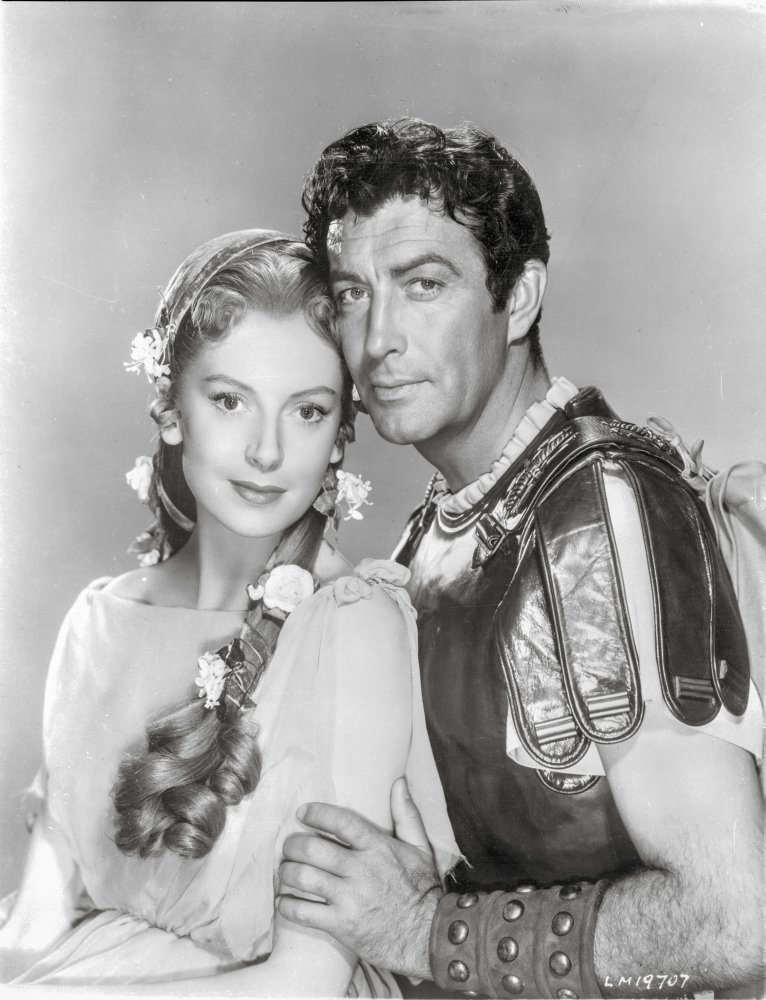Quo Vadis (1951) starring Robert Taylor, Deborah Kerr, Leo Genn, Peter Ustinov
Quo Vadis is the kind of movie that Hollywood doesn’t, and won’t, make anymore. It’s a three-hour epic, telling the story of Marcus Vinicius (Robert Taylor). He’s a Roman general returning to Nero’s Rome after 3 years of service in the field. There, he swiftly falls in love with a lovely Christian, Lygia (Deborah Kerr). This star-crossed romance is interwoven among the spectacle, and debauchery, of Nero’s Rome.
![]() Nero, played wonderfully by a young Peter Ustinov, is vain, plotting, insane and a delight to watch — from a distance. His only “friend” is Petronius (Leo Genn), whose sarcastic quips supply much of the comic relief through otherwise depressing scenes …. Such as Nero burning down Rome. Nero blames the oppressed Christian minority for it. Ending with a mammoth scene in the Roman Coliseum, feeding scores of believers to the lions.
Nero, played wonderfully by a young Peter Ustinov, is vain, plotting, insane and a delight to watch — from a distance. His only “friend” is Petronius (Leo Genn), whose sarcastic quips supply much of the comic relief through otherwise depressing scenes …. Such as Nero burning down Rome. Nero blames the oppressed Christian minority for it. Ending with a mammoth scene in the Roman Coliseum, feeding scores of believers to the lions.
Christianity in the movie
Although a somewhat watered-down version of the Christian gospel is presented …. It’s still somewhat surprising (by modern Hollywood standards, at least) to hear Christianity put in a positive light. There are extended appearances by actors portraying the Apostles Paul and Peter, and generally displaying Christianity in a positive light.
Quo Vadis is a 3-hour long movie, but never plodding or boring — I enjoyed it immensely, and recommend it highly.
Editorial review of Quo Vaids (1951), courtesy of Amazon.com
“Welcome to Nero’s House of Women” greets a concubine to a slave girl, Lygia (Deborah Kerr). Later this self-same greeter reveals that she, too, like Lygia, is really a fellow Christian neophyte. And it’s that mixture of tawdry Hollywood sex and a strong Christian message that makes this film an enjoyable “gentiles and gladiators” flick. Marcus Vinicius returns home after conquering the Britons to find that Rome is infected with a crazy new sect called Christians and that his beloved emperor Nero (Peter Ustinov, roly-poly and wicked) has become increasingly wacky.
Romance and conflict
Marcus tries his centurion wiles on Lygia, and she’s smitten, but she’s also a Christian convert and begs Marcus not to force her to choose between him and her God. The Christians have a tough go of it, with martyrdom in the Coliseum as punishment for belonging to the new religion in town. Though three hours long, director Mervyn LeRoy’s film always has something going on. It could help you enjoyably kill any rainy Sunday afternoon. — Keith Simanton
Cast of characters
- Robert Taylor (Flight Command) … Marcus Vinicius
- Deborah Kerr (Separate Tables; Marriage on the Rocks) … Lygia
- Leo Genn (The Strange Case of Dr. Jekyll and Mr. Hyde) … Petronius
- Peter Ustinov (Logan’s Run; We’re No Angels) … Nero
- Patricia Laffan (Devil Girl From Mars) … Poppaea
- Finlay Currie (Corridors of Blood; Solomon and Sheba) … Peter
- Abraham Sofaer (Christopher Columbus; The Greatest Story Ever Told) … Paul
- Marina Berti … Eunice
- Buddy Baer (Giant from the Unknown; Jack and the Beanstalk) … Ursus
- Felix Aylmer (The Mummy (1959)) … Plautius
- Nora Swinburne (Christopher Columbus) … Pomponia
- Ralph Truman (Christopher Columbus) … Tigellinus
- Norman Wooland … Nerva
- Peter Miles (Doctor Who: Genesis of the Daleks) … Nazarius
- Geoffrey Dunn … Terpnos
- Nicholas Hannen … Seneca
- D.A. Clarke-Smith (The Man Who Knew Too Much 1934) … Phaon
- Rosalie Crutchley … Acte
- John Ruddock … Chilo
- Arthur Walge … Croton
- Elspeth March … Miriam
- Strelsa Brown … Rufia
- Alfredo Varelli … Lucan
- Roberto Ottaviano … Flavius
- William Tubbs … Anaxander
- Pietro Tordi … Galba
Trivia for Quo Vadis
- Nero remarks on the idea of creating an experience in order to gain inspiration. And he complains that for his “conflagration”, he has not yet seen a burning city. Petronius replies; “A burning city? That would be carrying art for art’s sake too far”. “Ars Gratia Artis” is, of course, the motto of the studio that made the film, MGM.
- In An Audience with Peter Ustinov, Ustinov recalled that he had been attached to the role of Nero for over a year before filming began. During this time he received a memo from the producers, informing him that they still wanted him for the part …. But were concerned that he was too young. Ustinov replied that Nero died when he was 31; if they waited much longer, he would be too old for the part. He then received a reply, which he said he had kept and treasured. The reply stated: “Historical research has proved you correct.”
- The film represented a hollow victory for MGM studio chief Louis B. Mayer, since it turned out to be his final big-budget production. Produced for $7 million, it was MGM’s largest grosser since Gone with the Wind. But Mayer had been forced out of his job prior to its release.
- One immediate problem they encountered with the lions was that when they were released from their cages, they found the arena so hot, they’d immediately retreat back into their cages. Director Mervyn LeRoy overcame this problem by having several costumes filled with meat.
- True to his reputation as a voluptuary, the real Petronius took a week to kill himself …. By allowing his wounds to bleed and binding them up again. Reportedly he entertained friends, ate, drank, and slept during the weeklong ordeal.



